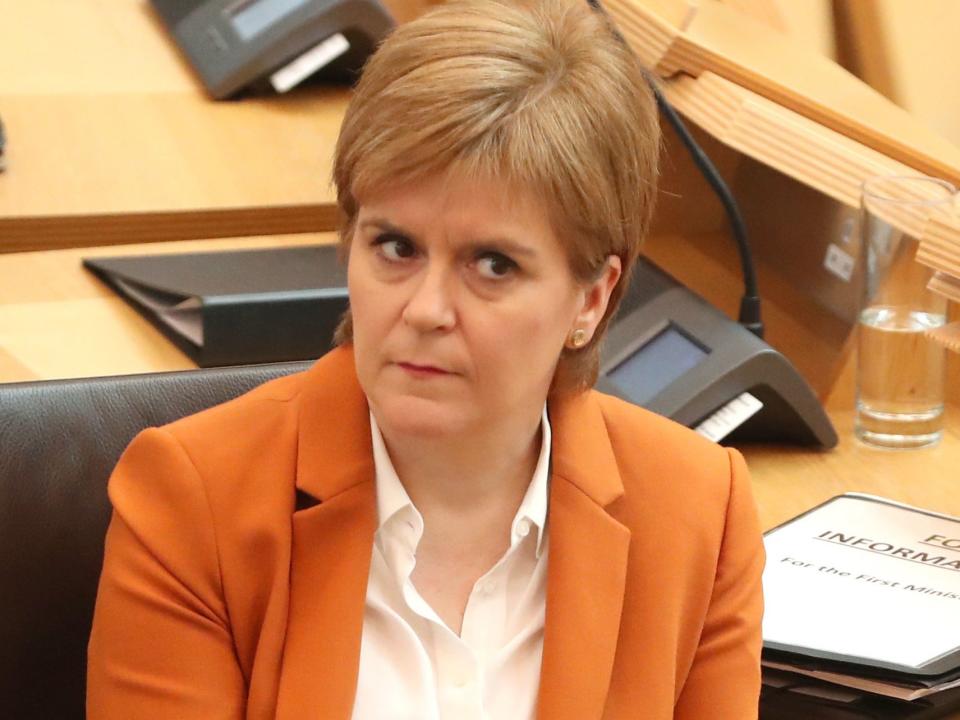Scotland’s decision to deny Westminster consent for the EU Withdrawal Bill could spark the worst constitutional crisis the country has ever seen
At Prime Minister's Questions on Wednesday, Jeremy Corbyn asked Theresa May just how much friction she was willing to tolerate on the border. He was of course talking about customs restrictions at the Irish Border and so the term “frictionless border” has entered the dire lexicon which “Brexit” has inflicted upon our political discourse. At another border, less noticed but still extremely significant, there is not so much friction as crackling electricity which threatens to spark a full-blown constitutional crisis.
On Tuesday, the Scottish parliament voted to deny Westminster consent for its EU Withdrawal Bill, because the legislation would involve Westminster withholding powers for up to seven years over 24 key devolved areas which, if not in Brussels, would ordinarily reside in the Scottish parliament. The Welsh assembly, which had shared the Scottish government’s position recently, decided to grant consent after some concessions were offered. However, Nicola Sturgeon remains unconvinced, accusing the UK government of a power grab. “They have a decision to make as to whether they are going to ignore the views of the Scottish parliament or listen to those views and try very hard to get a deal and to close the gap that remains between us.”
Only once before has the Scottish parliament refused consent to Westminster, on the Welfare Reform Act 2012, after which the UK government backed down. The details of this row may appear somewhat dry to the public, tussles over arcane “clause 15” powers, buried under soporific jargon like “legislative consent”, but on dry tinder the most fearsome blazes may quickly catch.
The Scottish parliament, would for the first time since 1999, be overruled on areas that it was destined to control by Westminster. The two governments will now fight it out before the Supreme Court in July, which will shape the nature of devolution and the debate on independence from the UK for years. This is to SNP grievance politics as sunshine is to an afternoon in Glasgow – a rare event to be fully exploited.
Sturgeon’s march to a second independence referendum were delivered a savage blow at the 2017 general election, where she lost many of her MPs and polls on those favouring a split with the union have hardened along the lines of the 2014 referendum result. Scottish voters, who elected by two-thirds to remain the European Union, are nonetheless cautious about ditching the single market and customs union of the United Kingdom.
Yet Brexit has not played out, and should it be seen as a cover for a clumsy Tory government, eternally deaf to Scottish sentiment, to tread over the devolution settlement it may find it tread on thistles. It is clear that the SNP seek to use this crisis to play to their nationalist base and fuel resentment with a rapacious Westminster eager to devour Scottish autonomy.
But simply because Scottish nationalists seek to use the crisis for political advantage does not mean they do not have a point. It was not just the SNP who voted to withdraw consent, but Scottish Labour and Liberal Democrats who delivered devolution in 1998.
May’s government, consumed with trench warfare within itself, resists the call from across Scottish politics (with the exception of Ruth Davidson’s isolated Scottish Tories) because it threatens their own nationalist separatist project. The fear is that if the UK government cannot hold the veto on national frameworks on policy areas such as agriculture, the Scottish government, which aims to keep its regulations close to Brussels, would diverge from UK attempts to dilute regulations to reach free trade agreements with the US (chlorinated chicken anyone?) and other countries. For this is why fundamentalist Brexiteers like Liam Fox, Jacob Rees-Mogg and the European Research Group (a party within the Tory party) desire Brexit above all; the opportunity to create a low tax, low regulation economy. This ideology is deeply entrenched within British nationalism, which views Brussels much as the SNP view London.
The friction here is between two nationalisms, two tribes, wrestling for power. And it is not for the sake of policy or good governance and certainly not to achieve a smooth transition of power from Brussels after Brexit. They want to use the crises as a vehicle for their respective separatist ambitions. And caught between them as ever is the Scottish people, who for over a decade have had constitutional politics displace debate over how to improve their services, health, agriculture, regulations – how to build a good society.
In this vein, most simply want a deal. The new Scottish Labour leader Richard Leonard, who voted to withdraw consent, has nonetheless offered to broker talks to resolve the deadlock and avert the worst constitutional crises in modern Scottish history. This pragmatism may yield results – the Scottish people have voted against Brexit, against independence and have said again and again that they support devolution of powers. If the Tories, who opposed devolution in 1998, are seen again to be its enemy, it is not just the Tory party who may bear the cost, but the entire union.
Donald Dewar, the father of the Scottish parliament and “first first minister” once remarked that “devolution is a process, not an event”. Well, maybe, but it is charitable in the extreme to call this a process. If the Theresa May will not listen to the express will of the Scottish parliament, she risks that process coming to an end.


